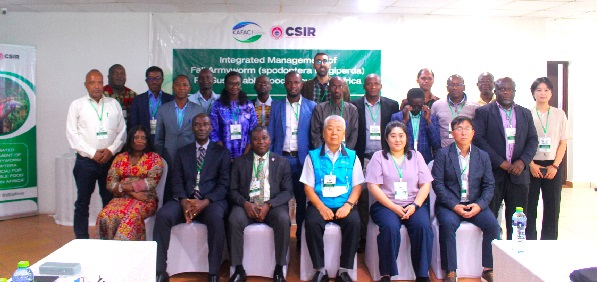THE Chief Director of the Ministry of Environment, Science, Technology and Innovation (MESTI), Rev. Dr Patrick Nomo, has called on the Council for Scientific and Industrial Research (CSIR) to intensify efforts at providing the government with vital data in its field of endeavour to inform effective policy formulation on agriculture.
These insights, he explained, are critical in developing strategies to mitigate the impacts of climate change on agriculture and rural livelihoods.
He made the call at the opening of the 2024 Annual Progress Monitoring Meeting of the 'Integrated Management of Fall Armyworm (FAW) for Sustainable Food Security in Africa' project in Accra.
Justifying his call, he explained that climate change was a pressing reality that was already affecting agriculture, water resources and the environment.
He said prolonged droughts, as witnessed this year, had devastated crops, taking a heavy financial toll on farmers.
Over-reliance on chemicals
Additionally, Dr Nomo raised grave concerns about what he described as the increasing frequency of pest outbreaks, and the over-reliance on chemical insecticides to manage the situation.
He said the improper use of such chemicals posed significant risks to human health, food safety, and the environment.
To him, it was, therefore, imperative that research focuses on developing environmentally friendly pest management practices that could improve the quality of agricultural produce while safeguarding public health.
Project
The meeting, organised by CSIR with support from the Korea-Africa Food and Agriculture Cooperation (KAFACI), brought together all the 16 Principal Investigators of participating countries to present and discuss their reports on the effective management strategies they are deploying to sustainably contain the Fall Army Worms (FAW) in their respective countries.
The project, an initiative of KAFACI, is assisting 16 African countries to research and develop effective management strategies suitable for their individual countries on the FAW.
The countries are Ghana, Madagascar, Zambia, Zimbabwe, Malawi, Uganda, Kenya, Ethiopia, and Gabon.
The rest are Nigeria, Côte d'Ivoire, Senegal, Comoros, Morocco, Tunisia, and Sudan.
Since 2016, the invasion of FAW has plagued Ghanaian maize farmers, causing significant destruction during the germination and maturity stages of maize production.
In response, Ghana initially resorted to using synthetic insecticides to combat the rapid spread of these pests.
Although synthetic insecticides have been immensely valuable in the fight against the pest, their continuous use has been described by environmentalists and scientists as unsustainable.
For instance, the detrimental impact of FAW on maize producers and the nation as a whole prompted scientists to devise a more sustainable strategy.
In 2019, a team of Crop Research Institute (CRI) scientists, with funding support from the Korea-Africa Food and Agriculture Cooperation Initiative (KAFACI), began exploring the use of biological agents to combat FAW.
Development
The Director General (DG) of CSIR, Prof. Paul Bosu, said the KAFACI-funded project had been critical in safeguarding food security across the continent.
He explained that the FAW, an invasive pest, had caused unprecedented damage to crops in Africa, particularly maize, which was an important staple crop across the continent.
In Ghana, he said the devastation of maize fields in 2016 and 2017 led to widespread concern about food security.
In response, he said CSIR swiftly mobilised its researchers to find sustainable solutions to the pest crisis, adding that the timely intervention of RDA/KAFACI was essential in providing the needed financial support for the activities.
“Under the guiding principle of "taming nature with nature", the research team has worked diligently to develop environmentally friendly management practices for the fall armyworm,” Prof. Bosu said.
He added that over the last five years, the project has made significant strides, not only in Ghana but also across 15 participating African countries.
